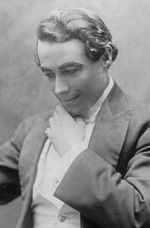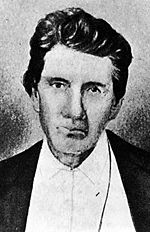1878
1878 was the seventh year after the founding of the city of Birmingham.
Events
- April 22: The Earle Post Office was established in what is now Dolomite.
- The city of Cullman was incorporated.
- William Fields purchased property for a farm in what became the Fieldstown community of present-day Gardendale.
Business
- July 18: The Pratt Coal and Coke Company, organized in January, was incorporated.
- The Birmingham & Pratt Mines Railroad, predecessor to the Birmingham Southern Railroad was built, connecting Pratt City's coal mines to foundries and railroads in Birmingham.
- Frank O'Brien purchased 125 feet of frontage on 1st Avenue for the exorbitant sum of $500.
Government
- Rufus Cobb succeeded George S. Houston as Governor of Alabama.
- William H. Morris resigned as Mayor of Birmingham; Henry Caldwell was appointed to finish the term.
- Thomas Jeffers took office as the next elected Mayor of Birmingham.
- A new Birmingham Board of Aldermen took office: Benjamin F. Roden, George W. Allen, Willliam A. Smith, Mortimer Jordan Jr, Jule Lockwood, and Frank Nabers.
- William Walker Jr was elected to the Alabama State Legislature.
- The Alabama State Legislature replaced the University of Alabama's Board of Regents with a Board of Trustees.
Religion
- The Shiloh Presbyterian Church building was relocated.
- Spring Street Baptist Church was founded in Elyton.
Individuals
- May: James Bowron visited Birmingham for the first time.
- December 5: Eugene Enslen married the former Della Evans.
- John Camp retired from the bench in Texas' state district court.
- Josiah Gorgas succeeded Carlos Smith as president of the University of Alabama.
- Thomas McDonald moved from Birmingham to Tuscaloosa.
- J. Q. A. Wilhite was ordained a minister in Louisville.
- James Hall graduated from Cumberland Presbyterian University and was ordained a minister in the Elyton Presbytery.
Births
- January 24: Joseph Zoettl, monk and sculptor
- February 28: Robert Jemison Jr, real estate executive
- March 1: Joseph Zinszer, retailer
- March 16: Henry Walthall, actor
- June 12: Paul Cole, Birmingham police detective
- September 2: Charles Rice, first Mayor of Homewood
- September 7: Charles Carraway, physician
- October 23: Jacques Wambsganss, photographer
- December 20: Isaac Beatty Jr, real estate executive
- Lucille Douglass, artist
- Henry Edmonds, founder of Independent Presbyterian Church
- Edna Gockel Gussen, musician
- Willie Lewis Staggs, Jefferson County constable
Deaths
- March 31: Moses Stroup, furnace master
- April: Matthew Duffee, hotelier
Context
In 1878, Thomas Edison received his first patent for the phonograph. Pope Leo XIII succeeded Pope Pius IX. Mississippi State University (as the Agricultural and Mechanical College of the State of Mississippi) was created by the Mississippi Legislature. The Tokyo Stock Exchange was established.
Notable books published in 1878 included The Return of the Native by Thomas Hardy and Human, All Too Human by Friedrich Nietzsche. Notable music composed in 1878 included "Aloha `Oe" by Queen Liliuokalani of Hawaii, "Ten Little Injuns" by Septimus Winner, Violin Concerto in D major by Pyotr Ilyich Tchaikovsky, and the musical H.M.S. Pinafore by Gilbert and Sullivan.
Notable births in 1878 included poet and historian Carl Sandburg, automobile manufacturer André Citroën, boxer Jack Johnson, actor Lionel Barrymore, dancer Bill Robinson, dancer Isadora Duncan, Mexican revolutionary Pancho Villa, musician George M. Cohan, author Upton Sinclair, Soviet leader Joseph Stalin, and automobile manufacturer Louis Chevrolet. Notable deaths included King Victor Emmanuel II of Italy, Pope Pius IX, politician William M. "Boss" Tweed, scientist Joseph Henry, religious leader Orson Hyde, and businessman Henry Wells.
| 1870s |
| << 1870 1871 1872 1873 1874 1875 1876 1877 1878 1879 >> |
| Births - Deaths - Establishments - Events - Works |

